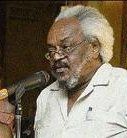Halifax Media Co-op
News from Nova Scotia's Grassroots
CBC blind spots on Haiti
Poor Haiti. “It is a hard luck country with a glorious past,” host Anna Maria Tremonte declared on the Wednesday edition of The Current, CBC Radio’s national daily current affairs program. Yes, poor Haiti. Tremonte seemed oh so sympathetic as she delivered a rapid-fire history that began with Haiti’s “glorious past”.
“Haiti was born out of a successful slave rebellion that took place two centuries ago. It was the first, black-led republic in the western hemisphere.” But, according to the CBC host, things somehow turned sour for Haiti. “Today, it is one of the poorest countries in the world. Grinding poverty, hunger and violence fills its days and nights, corruption hampers development on the national level."
Except for her reference to “hard luck,” Tremonte gave no explanation for Haiti’s troubles. She did not mention the economic, political and military oppression visited on the tiny Caribbean country by the U.S and two of its allies, France and Canada. Yves Engler summarizes it in his recent article Haiti’s Harsh Realities on the website Counterpunch:
“Through isolation, economic asphyxiation, debt dependence, gunboat diplomacy, occupation, foreign supported dictatorships, structural adjustment programs and ‘democracy promotion’ Haiti is no stranger to the various forms of foreign political manipulation. Most recently, the elected government of Jean-Bertrand Aristide was destabilized and then overthrown on February 29 2004 by the US, France and Canada, which ushered in a terrible wave of political repression and an ongoing UN occupation.”
The CBC rarely reports on Haiti and almost never mentions Canadian complicity in the overthrow of Aristide. CBC journalists prefer to look ahead and so, Anna Maria Tremonte went on to make it clear Haiti was in the news because of an international donors conference this week in Washington. She reported that donor countries had pledged $324 million over the next two years partly to help rebuild the country after devastating hurricanes last year. She added that Canada is already contributing $555 million over five years, money that will keep flowing until the end of 2011.
Tremonte then spent nearly twelve-and-a-half minutes interviewing Paul Collier, an Oxford economist, author of a book on the world’s poor and special adviser to the UN Secretary-General. Collier claimed that a UN Brazilian peacekeeping force has brought security to Haiti. Now, he said, donor countries should create jobs in Haiti by helping to set up more low-wage factories to produce cheap clothing for export to rich countries such as the U.S. and Canada.
Collier rejected the word "sweatshops" for such factories preferring to characterize his plan, which he outlined earlier this month in a British newspaper, as a first step toward economic self-sufficiency.
After her leisurely interview with Collier, Tremonte introduced John Maxwell, a veteran Jamaican journalist and author of an article called Haiti: The Audacity of Hopelessness published this month on the website Black Agenda Report. During his nine minute interview, Maxwell angrily dismissed Collier’s plan as an unworkable one that would enrich Haiti’s business elites. "Haiti’s history is a history of abuse," Maxwell said. “It cannot be rescued by putting some slave-labour jobs in place.”
Maxwell went on to argue that the small group of rich families which control Haiti’s economy and that helped overthrow Aristide should be “tried and neutered” just as the rulers of Nazi Germany had been after the Second World War. "This is what needs to be done in Haiti where you have a tradition going back 200 years of abuse by the United States, France and Canada," Maxwell said. He added that although Canada started participating in this abuse only recently, its actions were “particularly awful.”
When Tremonte asked, “How so?” Maxwell referred to a diplomatic conference organized by Quebec Liberal MP Denis Paradis that plotted the removal of Aristide under the rubric of the Responsibility to Protect doctrine.
After Maxwell complained that the Canadian and American publics know nothing about their governments’ deliberate subversion and overthrow of Aristide, Tremonte tried repeatedly to steer him back to Collier’s ideas about creating low-paid textile jobs in Haiti. Their testy exchanges illustrated mainstream journalism’s habit of sticking to a narrow focus based on recent events rather a wider one that includes historical context. It also demonstrated the journalistic tendency not to challenge governments’ explanations for their international actions. Thus, the CBC routinely portrays Canada as a generous international donor anxious to improve living conditions for the desperately poor in Haiti.
“Aristide wants to bring poor people into power,” John Maxwell insisted. He noted however, that international donors are determined to impose their own economic plans. "We need to give the Haitians the power to decide what they want to do," Maxwell said. "They want to be able to farm their land. They want to be able to replant their trees. They want to be able to have their families in co-operative enterprises...The basic thing that they want is the freedom to make their own decisions not to be told by Bill Clinton and Paul Collier what they want."
After Tremonte warned that there was less than a minute left in their interview, Maxwell tried to tie everything together. "The Haitians are being deprived of the right to make their own decisions," he insisted. "The Haitians are a people of great genius, great heroism and they have the right to decide what the hell they want to be and who they want to be. And the world has been trying, the Americans, and the Canadians and the French have been trying to stop them for the last 200 years. And it’s time that this wickedness stops!"
Maxwell got to speak his impassioned words, but also had to contend with Anna Maria Tremonte's repeated attempts to narrow the focus of their discussion to Paul Collier's proposal for more low-wage textile jobs. Collier was cast as a calm, sophisticated, forward-thinking optimist with constructive proposals for lifting Haitians out of their grim poverty. Maxwell, on the other hand, was forced to play the role of the angry critic, concerned about historical wrongs that the CBC rarely, if ever, reports. The producers' decision to conduct separate interviews prevented Maxwell from challenging Collier directly.
Under the circumstances, how could anyone rate the The Current's coverage as meeting the standards of fairness and balance that the CBC claims to uphold?
The site for the Halifax local of The Media Co-op has been archived and will no longer be updated. Please visit the main Media Co-op website to learn more about the organization.




